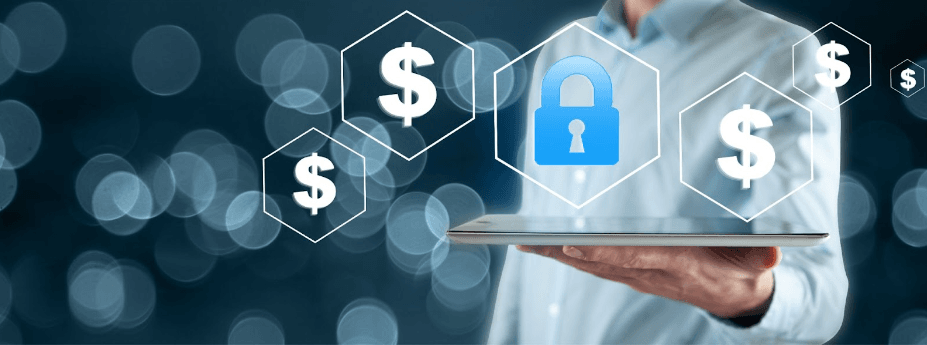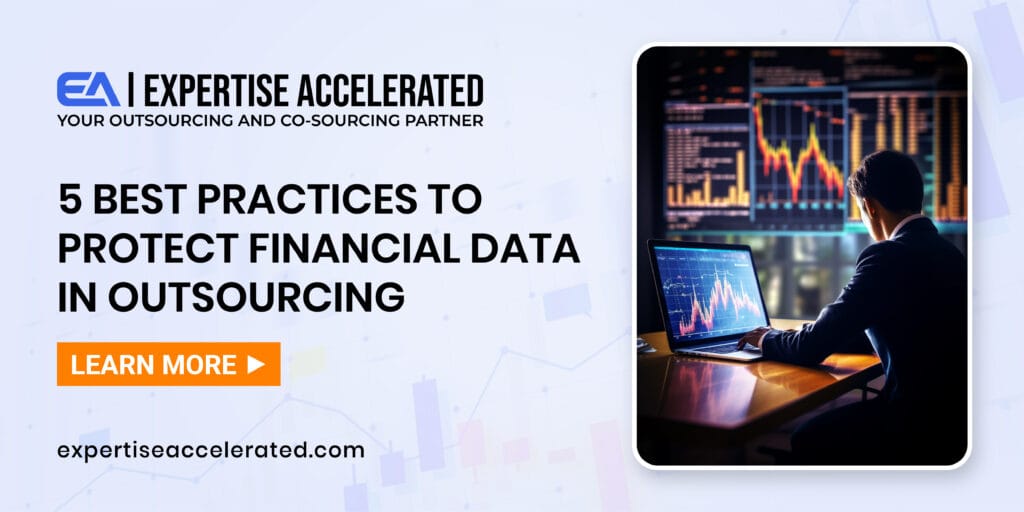Considering the recent surge in CEO deepfake attempts this year, the topic of protecting financial data in outsourcing is more important than ever before. For instance, recently a finance worker was tricked into authorizing a $25 million transfer by the deepfake of their CFO.
Temano Shurland, a Deloitte Risk & Financial Advisory principal in finance transformation, Deloitte & Touche LLP emphasizes on the growing importance of the subject “While there may not have been much need for accounting, finance and cyber teams to work closely in the past, recent years have shown that’s no longer the case. We strongly recommend that these teams try to ‘learn each other’s languages’ and tighten their working relationships across silos.”
As technology continues to advance, there are going to be more security threats affecting every industry. Hence, it is crucial for outsourcing firms to prioritize the protection of financial data of their clients.
This guide outlines how to protect financial data when working with outsourced accounting firms. Plus we also discuss what measures are in place at Expertise Accelerated to protect our clients’ sensitive financial data. Let’s get started.
What is Data Security in Outsourced Accounting?

Data security in outsourced accounting includes protecting sensitive financial information from unauthorized access, disclosure, alteration, or destruction. This is especially critical in outsourced accounting because data is often shared between different organizations.
Accounting includes susceptible information like taxes, payroll, and financial reports. A data breach can cause financial loss, harm your reputation, and lead to lawful problems. So, keeping this information safe is essential when outsourcing.
Common Security Risks in Outsourced Accounting
When outsourcing accounting, the following are the main risks:
- Someone outside your company might get access to private financial data.
- Hackers could access the information sent between you and the service provider.
- The provider may store your data in places with different security levels or laws.
- Different countries have different rules on data privacy, which can complicate things.
AI and Cybersecurity Threats
Cybercrime remains a significant issue, despite the available guidance and tools. For instance, In 2023, Twitter experienced a data breach affecting more than 220 million users. IBM documented that 2023 had the highest average cost for data breaches— five million dollars each.
While human error is often blamed, the rise of AI is also a major factor in making cyberattacks worse. AI has given hackers more ways to break into systems, even as security improves. Now, it’s a race between security experts and hackers. Here’s how AI is changing common cybersecurity threats:
Phishing and Social Engineering
Phishing scams are harder to spot now. In the past, you could identify them by spelling mistakes or poor grammar. But with AI, hackers can create perfect emails in any language. They can also hide their real email addresses, making these scams (Business Email Compromise) even harder to catch.
Hackers can also use AI to trick employees by mimicking a CEO’s writing style or creating fake videos and voices (deep fakes). These can fool businesses into giving away money, as happened with a company in Hungary.
AI-Assisted Hacking and Password Cracking
AI can make hacking faster and easier. Hackers can use AI to run automatic attacks, break into systems, and rob financial data (Account Takeover Fraud). Small businesses often don’t have the resources to defend against these attacks. Their best options are multi-factor authentication and secure cloud storage, but these may not always be enough.
AI makes cybersecurity more difficult, but it can also help protect against cyberattacks. The key is to stay informed and spread awareness. Businesses should concentrate on creating a strong cybersecurity culture to lessen threats. There’s no one-size-fits-all solution, but keeping up with the latest dangers and taking action is important.
Financial Data Protection Strategies
- Before choosing an accounting firm, make sure they have good security measures. Look for certifications or audits that show they handle data securely.
- Ensure you have a contract that specifies how to handle and protect data. Define who can access the data, actions for breaches, and how to delete data after the contract ends.
- Only give data access to those who need it. Use role-based access tools to restrict sensitive information to authorized individuals. Enable two-step verification for added security by requiring a code sent to your phone along with your password.
- Encrypt data when sending and storing it. This scrambles the data so it’s unreadable if someone tries to access it without permission.
- Check the security practices of the accounting firm. Keep an eye on who is accessing your data and if there are any exceptional activities.
- Make sure your outsourcing partner follows privacy laws to keep your data safe.
- Train staff on data security and phishing avoidance.
Simple Tips for Finance Outsourcing Security

1- Develop a Multi-Step Authentication Process
Create an authentication process that includes verbal and internal approval systems.
2- The Reverse Engineering Approach
Companies can adopt a proactive strategy: reverse-engineering deepfake attacks to identify vulnerabilities before they are exploited by hackers.
3- Teach Cyber Awareness
Most cyber-attacks happen because of errors people make. Ninety-five percent of attacks are due to human mistakes, according to Security Magazine. It’s easy for someone to click on a phishing email by accident.
Reduce mistakes by educating your team on common risks. For example, Phishing emails resemble real ones but have small changes, like extra letters in the address. Training your team to spot these differences can stop many attacks.Regular training can help protect your business from cyber threats.
4- Create Simple Security Rules
After training your team, establish basic rules for everyone to follow. Keep a list of trusted business emails and treat anything else as suspicious. Verify suspicious emails by calling the source. Only download approved software, and change passwords using a password manager. Enable multi-factor authentication for all accounts, and limit password access to trusted people. Always scan downloaded files with antivirus software. These simple steps can help prevent most cyber problems.
5- Use Security Tools
Use technology to protect your business. Antivirus software and password managers are great for keeping your data safe. Make sure to enable multi-factor authentication on your apps for added security.
If you’re using cloud software for accounting, pay for secure options. Avoid using pirated software it’s risky and can lead to serious problems like malware. Paying for secure software is always the safer choice.
What measures are in place at Expertise Accelerated to protect our clients’ sensitive financial data?
Our outsourcing bookkeeping team operates in the client environment using shared folders. Our clients only share those folders with us that they want us to see. If a client removes anything from that shared folder it becomes out of our sight and access.
Similarly, we never take access to client’s banking or credit card info or rights to initiate a transaction. If needed, at most, we take read-only access to the client’s payroll, banking, and credit card interfaces.
Conclusion
Outsourcing accounting can assist your business to succeed, but it’s necessary to save your financial data. You can keep your data secure by reviewing the provider’s security. Use strong contracts and limit access to sensitive data. Encrypt your data and follow privacy rules to enhance protection. Working with your service provider ensures your business stays secure and successful.
Expertise Accelerated outsourced accounting helps US businesses save money and stay secure. EA’s offshore accountants are skilled in cloud accounting, remote work, and cybersecurity. Small businesses can also save on training costs and get advice on the best accounting tools.


